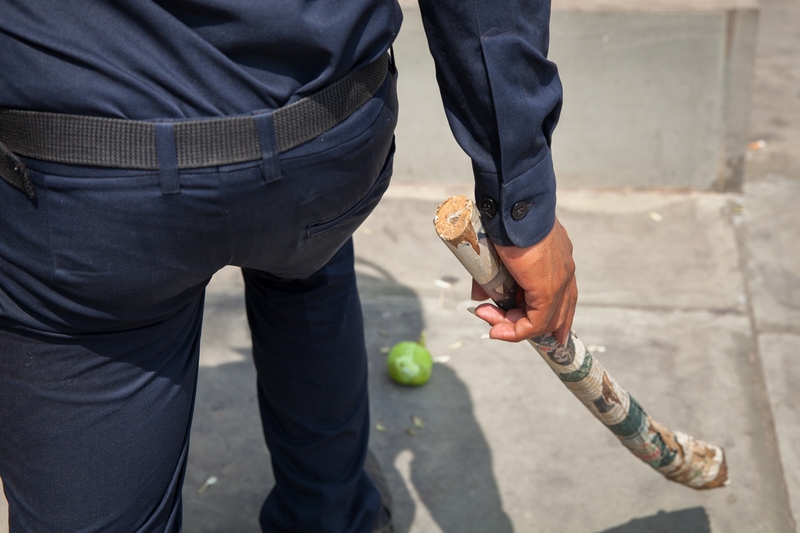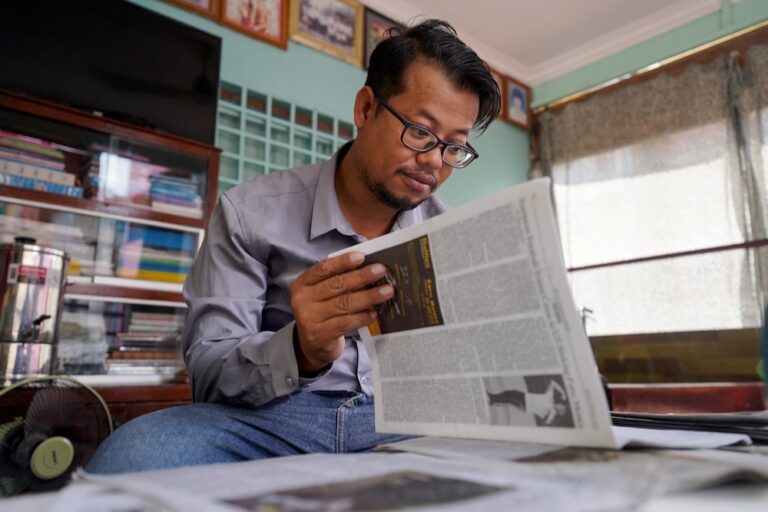RWB has expressed concern about the safety of journalists and their ability to carry out the work in Cambodia after recent attacks on freedom of the press in the country.
UPDATE from Cambodian Center for Independent Media: CCIM demands justice for injured journalist (24 August 2014)
Reporters Without Borders wishes to express its concern about the safety of journalists and their ability to carry out the work in Cambodia after recent attacks on freedom of the press in the country. The press freedom organization reaffirms its support for the efforts by local organizations that campaign for press freedom and the defence of journalists’ rights.
“To attack a journalist is an illegal act and a direct affront to freedom of the press,” said Lucie Morillon, Reporters Without Borders’ head of research. “We call on the authorities to find and punish those responsible for these actions and do all in their power to ensure the safety of journalists can be guaranteed in the country.”
On May 1, at least three journalists were roughed up by security forces near Phnom Penh’s Freedom Park, a location for rallies by the opposition. Daniel Quinlan, video journalist for the Phnom Penh Post, reported: “I’d just recorded the municipal security guards beating a guy on a motorbike and went back to the barricades to record them returning to Freedom Park. Suddenly they started yelling and two of them started moving towards me swinging their batons. An older man not in uniform then started hitting my legs with what appears to be a piece of wood covered in newspaper. One of the blows connected just below my kneecap causing bruising.” Just before that happened, another Cambodian journalist was beaten by police who had clearly pointed her out as a target.
The next day, Lay Samean, a reporter for Voice of Democracy radio was beaten up by security agents near Freedom Park as he was taking photographs of a monk being chased off with his colleague Oudom Tat. “There are about 50 Phnom Penh security guards trying to intimidate everyone there. I wanted to take pictures from the scene but I fell,” Samean said. “There, seven to 10 guards came to beat me with plastic and wooden batons. I told them three times I was a reporter but they continued. I woke up on a bench.” He now faces surgery for a broken cheekbone. On the same day, a freelance photojournalist covering the events for international news agencies was also targeted. “Tensions rose when security guards started hitting a demonstrator in front of me,” he said. “I was taking photos of it and a security guard pointed at me shouting: ” No photos, No photos”. Of course, I kept shooting. The next thing I know: the lens of my camera was out of the body – I actually first thought it was broken – and my forehead was hurt. I have no idea how it happened. Since then, I saw photos from colleagues who witnessed it around me and the security guard actually slapped me in the face with his walkie-talkie. Thanks to the helmet I had, he could not reach my face but went for my nose and the lens of my camera. To be honest I was in the middle of tensions, I was maybe too close, but I was definitely a target after taking the photo of the protester being beaten.”
On 4 May, the information ministry published a press statement condemning acts of intimidation, violence, seizure of equipment and insults to the journalists, noting that this was a serious breach of press freedom in Cambodia.
“The official response is important for journalists but does not go far enough,” Lucie Morillon added. “The authorities must carry out a serious investigation into these infringements so that recent progress on freedom of the press in the country is not undermined.” “It is important that the authorities take account of all instances where Cambodian and international journalists are prevented from doing their work, since there are still many sensitive subjects.”
On 18 April, the Club of Cambodian Journalists published a press statement stating: “The safety of journalists on the ground is under threat,” citing the beating up of at least two journalists and the brief detention of another for covering the illegal timber trade in the east of the country. On 26 April, a group of journalists went to the eastern province of Mondulkiri to cover the same subject. “We went to one of the most notorious locations for the trade,” said Rohany Isa, a journalist for the ThmeyThmey website. “The local authorities physically blocked our route with motorcycles and told us they had orders to stop us from getting through. We weren’t able to do what we wanted and we still don’t know how much damage has been caused to the forest. “It seems journalists’ freedom of movement is being curtailed in the country, which runs counter to progress that had been made. We strongly urge the government to allow access to information throughout the country and end its policy of making exceptions.”
“Cambodia enjoys a relatively free media environment compared to many other countries in Southeast Asia, but the government continues to treat press freedom as an indulgence, rather than a fundamental right,” said Sebastian Strangio, vice-president of the Overseas Press Club of Cambodia (OPCC). “Despite having a Press Law enshrining freedom of the media, Cambodian journalists reporting on sensitive topics continue to face intimidation, threats, and lawsuits from high-ranking officials and other politically-connected individuals.
“Since last year’s disputed election, reporters and photographers covering opposition protests and garment strikes have been attacked indiscriminately by security guards and other goons in the pay of the district authorities. “Though the Ministry of Information has condemned the recent attacks on journalists, the OPCC calls on the government to take concerted action to protect journalists and allow them to carry out their work without let or hindrance.”
The regions of Ratanakiri and Mondulkiri remain the most dangerous for journalists in Cambodia. In 2012, the journalist Hang Serei Oudom was found dead in the trunk of a car after taking photographs of the timber trade in Ratanakiri, a subject that he had covered widely. Cambodia is ranked 144th of 180 countries in the World Press Freedom Index compiled by Reporters Without Borders.



